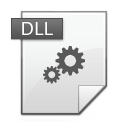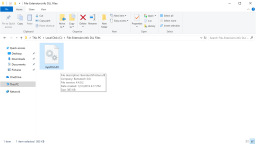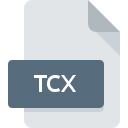
DLL File Extension
Dynamic Link Library
-
DeveloperMicrosoft
-
Category
-
Popularity3.7 (79 votes)
What is DLL file?
Files with the .DLL extension contain files of dynamically linked libraries, co-shared within Microsoft Windows system, and also OS/2.
Additional information:
All data can be loaded into memory and utilised by several programs simultaneously. These are often the AcriveX or the control panel controls, or some outdated drivers, or perhaps libraries of icons or fonts – although in such case, they usually have different extensions. They are also used as elements of different programs – plugins offering specific functions.
Libraries may contain:
- Code of sub-programs, plugins, functions,
- Data, including graphic,
- Associated resources
Specification of the DLL format is the same as the EXE files, however, the library does not constitute a separate program. Within the proper program, a reference to a library and its loading can be performed as late as when it is needed. Assumptions of DLL files support modular structure of application, the idea of reusing fragments of code, and lowering memory usage and required disc space.
Programs which support DLL file extension
Files with DLL extension, just like any other file formats, can be found on any operating system. The files in question may be transferred to other devices, be it mobile or stationary, yet not all systems may be capable of properly handling such files.
Programs that support DLL file
Updated: 12/31/2021
How to open file with DLL extension?
Being unable to open files with DLL extension can be have various origins. Fortunately, most common problems with DLL files can be solved without in-depth IT knowledge, and most importantly, in a matter of minutes. The list below will guide you through the process of addressing the encountered problem.
Step 1. Download and install Microsoft Visual Studio
 The most common reason for such problems is the lack of proper applications that supports DLL files installed on the system. The most obvious solution is to download and install Microsoft Visual Studio or one to the listed programs: Microsoft Windows, Visual FoxPro, Resource Hacker. Above you will find a complete listing of programs that support DLL files, classified according to system platforms for which they are available. If you want to download Microsoft Visual Studio installer in the most secured manner, we suggest you visit Microsoft Corporation website and download from their official repositories.
The most common reason for such problems is the lack of proper applications that supports DLL files installed on the system. The most obvious solution is to download and install Microsoft Visual Studio or one to the listed programs: Microsoft Windows, Visual FoxPro, Resource Hacker. Above you will find a complete listing of programs that support DLL files, classified according to system platforms for which they are available. If you want to download Microsoft Visual Studio installer in the most secured manner, we suggest you visit Microsoft Corporation website and download from their official repositories.
Step 2. Update Microsoft Visual Studio to the latest version
 If you already have Microsoft Visual Studio installed on your systems and DLL files are still not opened properly, check if you have the latest version of the software. It may also happen that software creators by updating their applications add compatibility with other, newer file formats. If you have an older version of Microsoft Visual Studio installed, it may not support DLL format. The most recent version of Microsoft Visual Studio is backward compatible and can handle file formats supported by older versions of the software.
If you already have Microsoft Visual Studio installed on your systems and DLL files are still not opened properly, check if you have the latest version of the software. It may also happen that software creators by updating their applications add compatibility with other, newer file formats. If you have an older version of Microsoft Visual Studio installed, it may not support DLL format. The most recent version of Microsoft Visual Studio is backward compatible and can handle file formats supported by older versions of the software.
Step 3. Assign Microsoft Visual Studio to DLL files
After installing Microsoft Visual Studio (the most recent version) make sure that it is set as the default application to open DLL files. The method is quite simple and varies little across operating systems.

Selecting the first-choice application in Windows
- Choose the entry from the file menu accessed by right-mouse clicking on the DLL file
- Click and then select option
- Finally select , point to the folder where Microsoft Visual Studio is installed, check the Always use this app to open DLL files box and conform your selection by clicking button

Selecting the first-choice application in Mac OS
- Right-click the DLL file and select
- Find the option – click the title if its hidden
- Select Microsoft Visual Studio and click
- Finally, a This change will be applied to all files with DLL extension message should pop-up. Click button in order to confirm your choice.
Step 4. Verify that the DLL is not faulty
You closely followed the steps listed in points 1-3, but the problem is still present? You should check whether the file is a proper DLL file. Problems with opening the file may arise due to various reasons.

1. Verify that the DLL in question is not infected with a computer virus
If the DLL is indeed infected, it is possible that the malware is blocking it from opening. It is advised to scan the system for viruses and malware as soon as possible or use an online antivirus scanner. DLL file is infected with malware? Follow the steps suggested by your antivirus software.
2. Ensure the file with DLL extension is complete and error-free
If the DLL file was sent to you by someone else, ask this person to resend the file to you. During the copy process of the file errors may occurred rendering the file incomplete or corrupted. This could be the source of encountered problems with the file. It could happen the the download process of file with DLL extension was interrupted and the file data is defective. Download the file again from the same source.
3. Check if the user that you are logged as has administrative privileges.
Some files require elevated access rights to open them. Log in using an administrative account and see If this solves the problem.
4. Verify that your device fulfills the requirements to be able to open Microsoft Visual Studio
The operating systems may note enough free resources to run the application that support DLL files. Close all running programs and try opening the DLL file.
5. Ensure that you have the latest drivers and system updates and patches installed
Regularly updated system, drivers, and programs keep your computer secure. This may also prevent problems with Dynamic Link Library files. Outdated drivers or software may have caused the inability to use a peripheral device needed to handle DLL files.
Conversion of a DLL file
File Conversions from DLL extension to a different format
File conversions from other format to DLL file
Do you want to help?
If you have additional information about the DLL file, we will be grateful if you share it with our users. To do this, use the form here and send us your information on DLL file.


 Windows
Windows 









